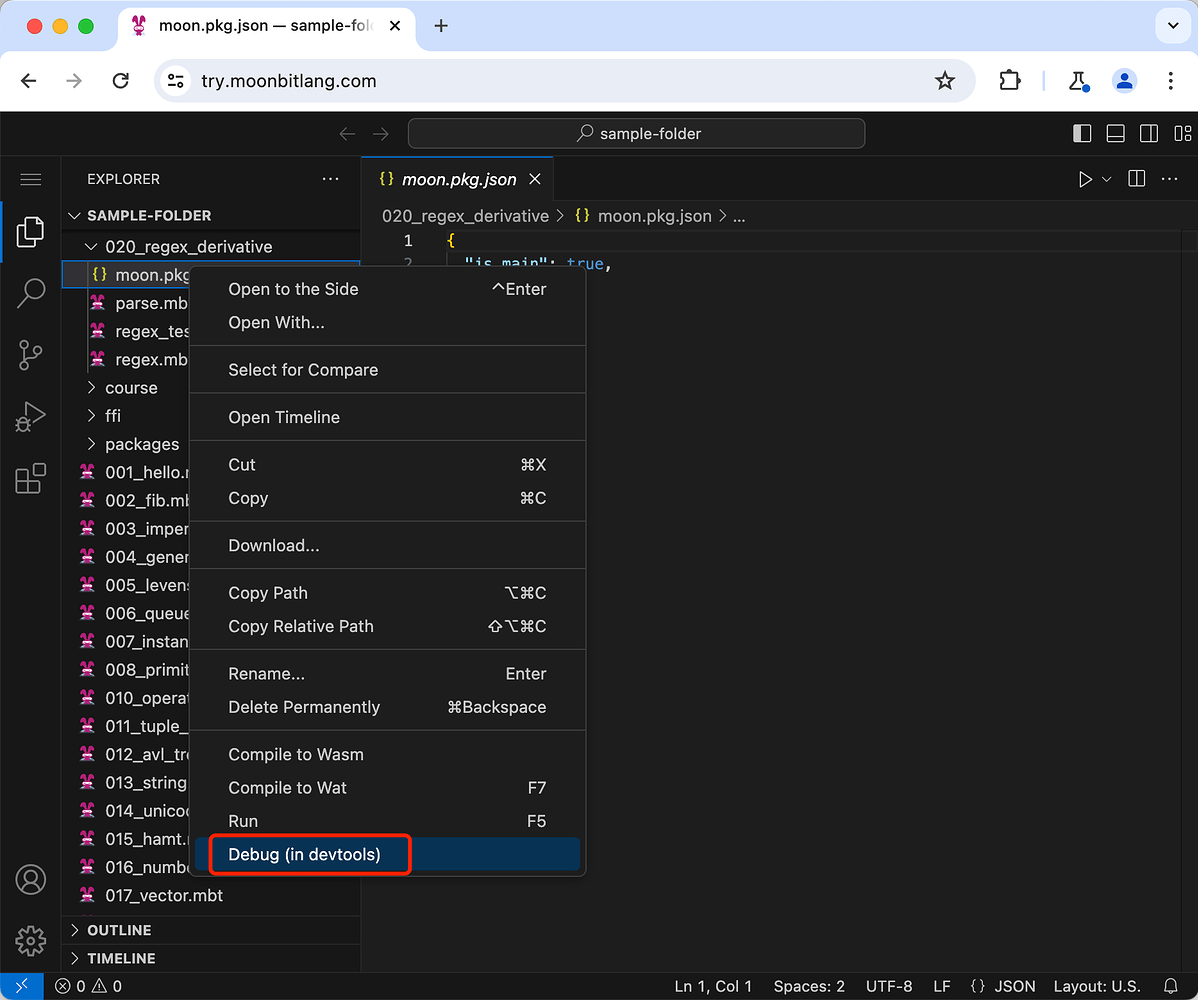weekly 2024-02-26
MoonBit Update
1. Supports cloud-native debugging features.
Now, you can debug MoonBit programs directly in your browser using devtools by visiting try.moonbitlang.com, without installing any software. The steps are as follows:



2. MoonBit now supports functional loop control flow defined with the for keyword.
MoonBit now supports functional loop control flow defined with the for keyword, purely functional yet as efficient as C. For instance, the fib function can be written as follows:
fn fib( n : Int ) -> Int {
for i = 0, a = 1, b = 2
i < n
i = i + 1, a = b, b = a + b {
} else { b }
}
MoonBit's for loop can return a value as an expression. For example, in the program mentioned above, b is used as the value of the entire for loop after the loop ends. It's also possible to return early by using break within for loop body, like:
fn exists(haystack: Array[Int], needle: Int) -> Bool {
for i = 0; i < haystack.length(); i = i + 1 {
if haystack[i] == needle {
break true
}
} else {
false
}
}
Moreover, within the for loop, you can use continue to proceed to the next iteration, just as in traditional languages. MoonBit further offers a parameterized continue to specify the value of the loop variable in the next iteration of the loop, for example:
fn find_in_sorted[T](xs: Array[(Int, T)], i: Int) -> Option[T] {
for l = 0, r = xs.length() - 1; l < r; {
let mid = (l + r) / 2
let k = xs[mid].0
if k == i {
break Some(xs[mid].1)
} else if k > i {
continue l, mid
} else {
continue mid + 1, r
}
} else {
None
}
}
In cases where a return value is not required, the else branch can be omitted, like:
fn print_from_0_to(n: Int) {
for i = 0; i <= n; i = i + 1 {
println(i)
}
}
3. Inline Test Improvements
The return type of tests has been changed from Unit to Result[Unit, String] to represent the outcome of the test:
test "id" {
if (id(10) != 10) { return Err("The implementation of `id` is incorrect.") }
}
The compiler automatically wraps the block {...} in a test "id" {...} statement with Ok(). Therefore, when the block type is Unit and there is no early return, it indicates that the inline test has passed. Combined with the question mark operator, this makes testing more elegant:
fn id(x : Int) -> Int {
x + 1 // incorrect result
}
fn assert(x : Bool, failReason : String) -> Result[Unit,String] {
if x { Ok(()) } else { Err(failReason) }
}
test "id" {
assert(id(10) == 10, "The implementation of `id` is incorrect.")?
}
Running moon test, generates the following output:
➜ my-project moon test
running 1 tests in package username/hello/lib
test username/hello/lib::hello ... ok
test result: 1 passed; 0 failed
running 1 tests in package username/hello/main
test username/hello/main::id ... FAILED: The implementation of `id` is incorrect.
test result: 0 passed; 1 failed
Hello, world!
4. Improved function signature hints in the VS Code extension, now displaying parameter names:

5. Enhanced support for core package development in the VS Code extension.
6. moon new supports the rapid creation of new projects.
-
moon new hellocreates an executable project namedusername/helloinside thehellofolder. -
moon new hello --libcreates a library namedusername/helloinside thehellofolder.